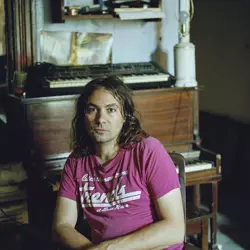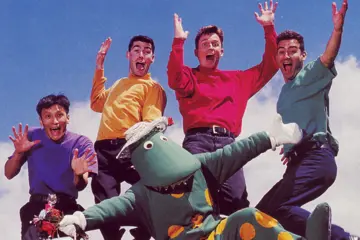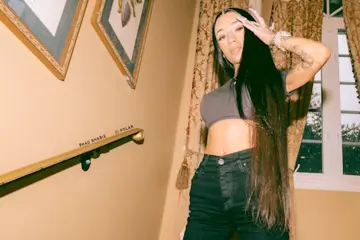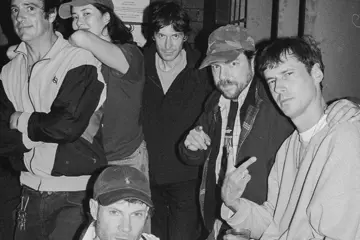 The War On Drugs
The War On DrugsSometimes the tangible residue of creative partnerships far outlasts the tenure of the actual union. Take, for example, the bond between The War On Drugs' frontman and creative lynchpin Adam Granduciel, and his friend and former bandmate Kurt Vile. The pair co-founded The War On Drugs in Philadelphia back in 2005 and their 2008 debut longplayer, Wagonwheel Blues, soon garnered them lots of positive attention for its deft marriage of classic-sounding songwriting – Dylan, Springsteen and Petty are the usually-cited touchstones, Granduciel attesting, “I really dig that classic stuff, although I listen to Neil Young more than the other people that they mention” – which is filtered through more abstract and atmospheric sensibilities, effects-laden textures giving the band a completely distinctive sound and feel.
When Vile left the band as a full-time concern to concentrate on his solo career it wasn't as big an issue as it was made out to be in some quarters – he still played on the band's 2011 second effort, Slave Ambient, and Granduciel contributed to Vile's 2011 solo breakthrough, Smoke Ring For My Halo – but even in his absence he still had a massive influence on the sound and direction of the new music Granduciel was concocting, mainly because he wasn't there to tell his friend when to stop.
“I think it was just evolution in my writing – I had a lot more interest in home recording,” Granduciel recalls of the more ambitious and assured tones of Slave Ambient. “I did for Wagonwheel Blues too, but it was at a different level I think. Some of the stuff that I did at the end of Wagonwheel Blues was kind of like the blueprint for Slave Ambient – I was just a lot more into home recording, and just weirder ways of arriving at sounds. It was a little more insular too. With Wagonwheel... – with the exception of songs that I did when I was younger – most of that stuff was me and Kurt playing off each other, and I didn't really have anybody like that on Slave Ambient, so it was a little bit more of an insular thing. Which is cool, but it ended up forcing me to have a little more confidence in what I was doing.
“It was a long process – a lot of the time I knew what I wanted the songs to feel like, but I didn't really know if I wanted them to sound a certain way, so sometimes it would take a long time to arrive. I had to listen until it made me feel a certain way and I liked the way that it sounded. But I wasn't really going for any sound in particular – I think my inability to really sometimes know exactly what I wanted was why it ended up being what it was.”
Don't miss a beat with our FREE daily newsletter
Granduciel's unique method of songwriting was time consuming, precisely due to its in imprecise nature – it's all about taking ideas and manipulating them, to assess them from every possible angle, looking for an imperceptible something that's not visible from the surface,
“It was mostly textures and arrangements I was playing with, usually. I'd have a song written in some capacity and I'd have a cool recording with lots of cool textures, but something about the arrangement or the song itself wasn't doing it for me, so I'd take the bare bones of this one song and think, 'Well those drums are sweet,' so I'd take those drums and write a whole other song over the top of it, and then six months later I'd have three or four different versions of the song all with the same drums, so you can fly in parts from one version into another version – that's truly what it was about, taking the best parts of various recordings and kind of melting them all together into this one thing.”
But how does the creator know when these sonically ambitious, dense soundscapes are finished? He doesn't, apparently.
“The only reason it was finished in the end [was] because we were going on tour and we had to have it done,” he laughs. “Our label said, 'If you don't have it to us by this date we're not going to put it out' – because by that point they were a bit... not fed up, but they were like, 'Where is this record?' They hadn't even heard it, so they were like, 'Dude, you're really taking four years to make this stupid record?' But I needed to finish it.
“Luckily I had the help of my friend Geoff Ziegler and his studio in Philly; he was the one who in the last six months worked really closely with me. It was really shitty for him too, because we'd work on this version of a song, and then I'd come over the next day with like four tapes and say 'Okay now we have to sync all of this shit up' and he'd be, like, 'What!?' It was a lot of transferring and syncing up, and we have the same tape machine, which was a blessing and a curse because we could work on stuff at his place and then I'd take the tapes home and overdub until eight in the morning, and then come back to his place and put it on and it would be totally different to what we'd done the night before. He'd think I was going home to bed and I'd come back with a completely different song. But we found a happy medium between my insanity and his ability to say, 'It's fine the way it is!' If I didn't have Geoff I would never have finished, because I could never have known when to leave it alone.”
So while Slave Ambient was essentially a solo affair – the band Granduciel bringing with him to Australia for their inaugural visit for Harvest Festival largely assembled after the album was completed – it seems like the idiosyncratic songwriter might try a different approach for album number three.
“I love making music and being in the studio, and buying weird gear for my studio. And making weird sounds at Geoff's house and buying weird keyboards – I just like the journey, I think. I love the creating – I love that initial spark of listening to what you've just laid down in the last few days, you go into this bubble and I love listening back to it all when the time's done and you don't have any more days booked. And I love the sharing part of playing it to people – the last couple of records I had to become more of a band after the fact, because I did most of the stuff either in the studio or on my own and then formed the band. In the future it will be more about having ideas and then playing them with the band, but I don't want to lose that singularity of making music on your own.”
The War On Drugs will be playing the following shows:
Sunday 10 & 11 November - Harvest Festival, Werribee Park, Melbourne VIC
Tuesday 13 November - Northcote Social Club, Melbourne VIC
Thursday 15 November - Oxford Art Factory, Sydney NSW
Saturday 17 November - Harvest Festival, Parramatta Park, Sydney NSW
Sunday 18 November - Harvest Festival, Brisbane Riverstage and Botanic Gardens QLD















